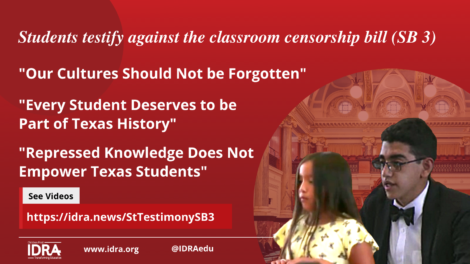• Ana Ramón • IDRA Newsletter • June-July 2021 •


Instead, the session was weighed down with political talking points and unnecessary issues that allowed partisan ideology to creep into substantive policy. While this is in no way unprecedented, many advocates remarked how this session felt like more of a culture war than it typically does, with legislators largely ignoring major issues faced by the state.
Bills that failed to pass this session included measures that would have ensured accurate and accessible data about school discipline and the CROWN Act that would have prohibited schools from discriminating against students of color based on their hairstyles. CROWN stands for Creating a Respectful and Open World for Natural Hair (CROWN Coalition, 2021). These and other bills would have created safer and more welcoming environments for students, particularly students of color. Instead, many in the legislature focused their attention on policies that could have harmful effects on young people in our state.
One of the most horrifying examples of that harmful focus was the clear attack on how teachers and students are able to discuss current events, history and discrimination in Texas classrooms (IDRA, 2021). House Bill 3979, by Rep. Steve Toth, was copycat censorship legislation consistent with a growing and partisan national scheme. The bill prohibits students from receiving course credit for certain internships and other extracurricular activities, stops school districts from making teacher training decisions, and prohibits social studies teachers from discussing topics related to our country’s history of racism and sexism.
IDRA testified in hearings and worked with many community advocates across the state to oppose the measure, including holding a virtual press conference and hosting, with the Texas Legislative Education Equity Coalition (TLEEC), a virtual hearing to provide a forum for community-led unofficial testimony after the Texas Senate denied input in its public hearing.
HB 3979 will likely have a chilling effect on important conversations in schools, making it harder for schools to address the discrimination felt by students of color. Though it was signed into law, Governor Greg Abbott announced that the issue would also be added to a special legislative session, creating opportunities for lawmakers to make the legislation even more harmful for Texas students. The expansion bill is Senate Bill 3. (See IDRA’s resources on HB 3979, SB 3 and similar measures at https://idra.news/3979info.)
The Texas legislature missed a number of key opportunities to address the existing, and now deepening, barriers that prevent young people, especially students of color, from accessing equitable and excellent public schools. These opportunities were not missed because of well-reasoned policy differences, but because of the increasing politicization of the education policymaking process. While, sadly, this is not a new phenomenon, our students deserve much better.
Resources
CROWN Coalition. (2021). Creating a Respectful and Open World for Natural Hair, website.
IDRA. (May 30, 2021). HB 3979, the “How-to Guide for Whitewashing History,” Likely to Become Law, statement. IDRA eNews.
Ana Ramón is IDRA’s deputy director of advocacy. Comments and questions may be directed to her via email at ana.ramon@idra.org.
[©2021, IDRA. This article originally appeared in the June-July 2021 IDRA Newsletter by the Intercultural Development Research Association. Permission to reproduce this article is granted provided the article is reprinted in its entirety and proper credit is given to IDRA and the author.]



